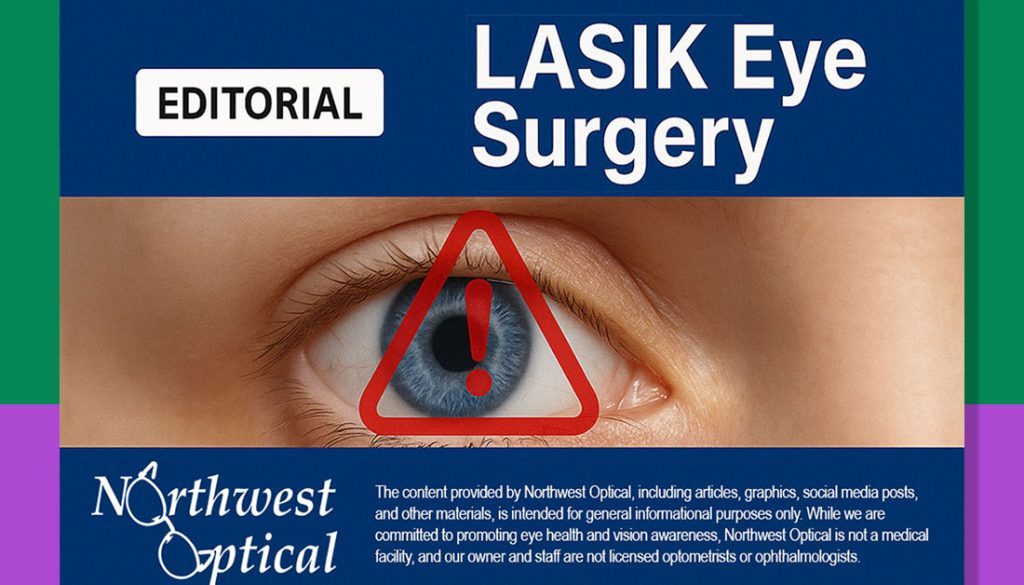LASIK Eye Surgery in the Headlines: What Patients Should Know — A Perspective from Northwest Optical
In recent months, LASIK (Laser-Assisted In Situ Keratomileusis) eye surgery has returned to the headlines—not for its long-standing popularity, but for new scrutiny surrounding its potential long-term side effects. While LASIK has helped millions achieve clearer vision without corrective lenses, a growing number of patient testimonials and investigative reports have highlighted the troubling experiences of a small subset of individuals who face debilitating consequences after the procedure.
As a local, independent optical provider serving the both Tacoma residents, and the Lakewood community for over 20+, Northwest Optical believes in supporting informed, empowered decision-making. While we are not a medical clinic and do not perform or recommend surgical treatments, we care deeply about eye health and vision education. Below, we’ll explore the latest LASIK-related concerns, how an optician’s role differs from that of an eye surgeon, and what alternatives exist for individuals seeking to improve their vision without surgical intervention.
What the Latest News Reports Say About LASIK
Recent investigative journalism—including reports aired by major networks and features in national newspapers—has highlighted a troubling trend: While LASIK is widely considered safe and effective, a minority of patients experience long-term complications that severely impact their quality of life.
Some of the most commonly cited issues in these reports include:
- Chronic dry eyes
- Blurry or fluctuating vision
- Starbursts, halos, and ghosting around lights (especially at night)
- Increased sensitivity to light (photophobia)
- Severe headaches or eye pain
- Difficulty driving or reading, especially in dim conditions
In the most severe cases, some patients describe these symptoms as debilitating, leading to depression or social isolation. The U.S. Food and Drug Administration (FDA) has previously studied LASIK outcomes, and while most patients report satisfaction, the agency has acknowledged that adverse events—though uncommon—can occur. In fact, the FDA has published guidance recommending that prospective LASIK patients be clearly informed about the risks, no matter how rare.
These recent stories are not meant to instill fear but to encourage a more nuanced understanding of LASIK’s benefits and limitations.
The Optician’s Role: Supporting, Not Diagnosing or Prescribing
Before diving deeper, it’s essential to clarify the difference between an optician, optometrist, and ophthalmologist—roles that are often misinterpreted in public discussions about eye care.
Optician (That’s Us)
An optician is a trained professional who helps you select, fit, and adjust eyewear based on a prescription provided by a licensed eye doctor. We do not diagnose medical conditions or perform eye surgeries. Our expertise lies in helping patients understand their prescription and providing stylish, functional eyewear that fits their lifestyle and vision needs.
Optometrist
An optometrist (OD) is a licensed doctor who provides comprehensive eye exams, diagnoses eye diseases, prescribes medications, and manages vision health—but does not perform most surgical procedures.
Ophthalmologist
An ophthalmologist (MD or DO) is a medical doctor who performs eye surgery (including LASIK), treats serious eye conditions, and can also prescribe corrective lenses.
As opticians, we do not and cannot recommend for or against LASIK. However, we can—and feel ethically compelled to—ensure that patients are fully informed about non-surgical alternatives and the importance of consulting with trusted, credentialed eye doctors before making decisions about their vision care.
Why People Consider LASIK in the First Place
LASIK remains a popular choice because of the promise it offers: freedom from glasses or contact lenses. It is especially appealing to people who:
- Lead active lifestyles and find glasses or contacts cumbersome
- Have jobs where glasses or contacts interfere (e.g., athletes, first responders, military personnel)
- Want a long-term solution to nearsightedness, farsightedness, or astigmatism
And for many people, LASIK does deliver on that promise. Studies estimate that more than 90% of LASIK patients are satisfied with the results and no longer need corrective lenses.
But satisfaction statistics don’t always tell the full story. A small percentage of patients may find themselves trading one visual inconvenience for another—sometimes much worse. That’s why a full understanding of the risks, benefits, and alternatives is so important.
What the Recent Focus on LASIK Should Teach Us
1. No medical procedure is risk-free
Even routine surgeries come with potential complications. LASIK, while minimally invasive and highly refined, still involves reshaping the cornea with a laser—an irreversible change. For some, the healing process may not go as planned. Others may have pre-existing eye conditions or dry eye syndrome that heighten their risk of complications.
2. Ask the hard questions
Consumers are often presented with only the benefits of LASIK: fast recovery, permanent results, and freedom from glasses. But patients deserve full disclosure about possible downsides, such as the risk of double vision, nerve damage, or visual distortions.
If a provider cannot answer questions directly, or seems dismissive of your concerns, it may be time to seek a second opinion.
3. Alternatives should always be part of the conversation
Surgery is not the only path to clearer vision. For many people, modern eyewear or specialty contact lenses provide highly effective, customizable, and completely reversible vision correction—without any medical risks.
Non-Surgical Alternatives: A Return to Simplicity and Comfort
At Northwest Optical, we work with hundreds of patients every year who choose to improve their vision through time-tested, non-invasive means. Some patients even come to us after LASIK when their vision changes over time and glasses are once again needed.
Here are some non-surgical solutions we often help patients explore:
1. Prescription Eyeglasses
Eyeglasses have come a long way. Today’s frames and lenses are lighter, more durable, and more stylish than ever. High-definition lenses, blue-light coatings, and progressive options allow for seamless vision correction tailored to daily tasks like computer use, driving, or reading.
Eyeglasses are also the safest and most easily updated form of vision correction.
2. Contact Lenses
For those who don’t want to wear glasses full time, contact lenses offer flexibility and comfort. Soft lenses, daily disposables, and even specialty lenses for astigmatism or presbyopia mean there’s an option for nearly every eye shape and condition.
At Northwest Optical, we help interpret prescriptions and guide patients toward lens types that offer both performance and safety.
3. Sunglasses with Prescription Lenses
Photophobia, or light sensitivity, is a common post-LASIK complaint. Even for patients who have never undergone surgery, harsh lighting and glare can be a real problem.
We offer prescription and non-prescription sunglasses or transition lenses that darken in sunlight, helping reduce eye strain while preserving visual clarity.
What We Can—and Cannot—Advise
As a community-based optical provider, Northwest Optical wants to be clear: We do not perform LASIK, we do not diagnose eye conditions, and we do not make medical recommendations. However, what we can do is:
- Listen carefully to your concerns about LASIK or any other vision-related issue
- Refer you to qualified optometrists or ophthalmologists we trust
- Explain your prescription and vision options in everyday language
- Help you explore non-surgical alternatives such as advanced lenses or frames
- Support you post-procedure if you’ve had LASIK and need corrective lenses again
We also encourage all patients—whether considering LASIK or not—to stay up-to-date on eye exams. Your eyes change over time, and regular exams are essential for catching issues early.
Questions to Ask Before Pursuing LASIK
If you’re thinking about LASIK, we encourage you to bring these questions to your eye doctor:
- Am I a good candidate for LASIK based on my eye health and lifestyle?
- What side effects are common, and what rare complications should I be aware of?
- What is the success rate at this specific clinic or with this specific surgeon?
- Will I still need glasses for reading or night driving after surgery?
- What happens if my vision changes again in 10 or 15 years?
These are not just technicalities—they’re critical to your decision-making process.
You Don’t Need to Rush
The appeal of LASIK is strong, especially in a culture that values quick solutions. But vision is too important to gamble. Whether you’re considering LASIK, contact lenses, or simply want better glasses, your decisions deserve time, care, and honest conversations with professionals.
At Northwest Optical, we take pride in helping patients feel comfortable and confident in their choices. We don’t upsell. We don’t push procedures. We provide clarity—both in your lenses and in your understanding of what’s best for your vision.
Final Thoughts: When Technology Meets Responsibility
Medical technology like LASIK can be incredible. But it’s not for everyone—and that’s okay.
In light of recent reports, we believe this is a valuable opportunity for the eye care industry to revisit how risks are communicated, how procedures are marketed, and how patients are supported both before and after surgery.
We’re here to help you navigate the vision landscape with transparency, warmth, and the belief that your sight deserves the best—not just the most popular—solution.
If you’re interested in learning more about glasses, contact lenses, or simply want a second opinion on your current prescription, we’d be honored to serve you.
Northwest Optical
7501 Bridgeport Way W, Suite C
Lakewood, WA 98499
By Appointment Only — Please call ahead (253) 572-5498
Disclaimer
The content provided by Northwest Optical, including articles, graphics, social media posts, and other materials, is intended for general informational purposes only. While we are committed to promoting eye health and vision awareness, Northwest Optical is not a medical facility, and our owner and staff are not licensed optometrists or ophthalmologists.
Any opinions expressed are those of Northwest Optical and are not intended to substitute professional medical advice, diagnosis, or treatment. We do not perform LASIK or any surgical procedures, and we strongly recommend consulting with a licensed eye care professional or medical doctor before making any decisions regarding surgical vision correction or treatment of eye conditions.
Use of this information is at your own discretion. Northwest Optical disclaims any liability for decisions made based on the content shared, as it should not be considered medical guidance or factual representation of medical procedures.


